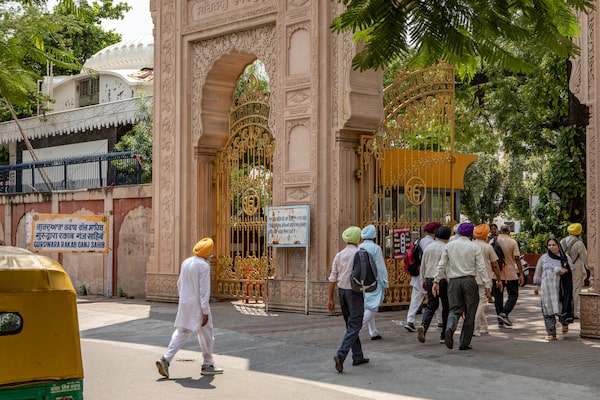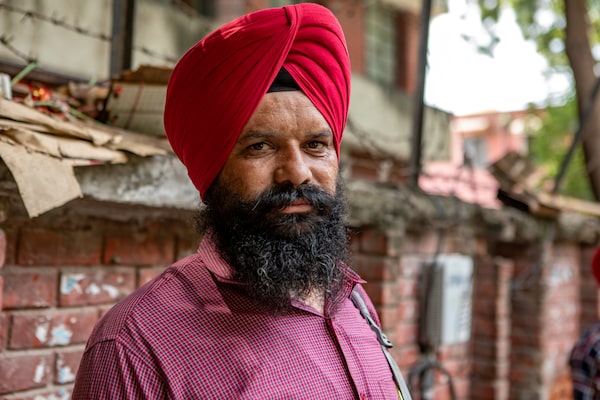
Worshippers arrive at the Gurdwara Rakab Ganj Sahib, a Sikh temple in central New Delhi, India, on Sept. 20.James Griffiths/The Globe and Mail
Advocates for a Sikh homeland want to establish an independent country called Khalistan in Punjab, a region of northern India a few hundred kilometres from New Delhi. But for many Sikhs living in the capital, the issue feels far more remote than that.
“This is something created and nurtured by people living in countries outside of India,” said Pramjit Singh, standing outside the ornate gates of the Gurdwara Bangla Sahib. As worshippers and tourists streamed into the golden-domed Sikh temple in the heart of Delhi, the taxi driver told The Globe and Mail that “Sikhs in India don’t care about Khalistan.”
His assessment of the situation echoes that of his government, which insists there is no real support for Khalistan in India, and blames foreign countries, including Canada, for harbouring extremists responsible for violence in Punjab and elsewhere.
New Delhi has long expressed frustration at Ottawa for not doing enough to rein in the Khalistan movement and refusing to extradite alleged terrorists to India.
A few days ago, Prime Minister Justin Trudeau said there was evidence that “agents of the government of India” were linked to the killing of a prominent Sikh separatist leader in British Columbia, Hardeep Singh Nijjar. The accusations have sparked an escalating diplomatic crisis between Canada and India, which has denied any involvement in Mr. Nijjar’s death.

Auto rickshaw driver Gurdayal Singh said it can be dangerous in India to speak about Khalistan, a proposed independent homeland for Sikhs in Punjab.James Griffiths/The Globe and Mail
The killing of Hardeep Singh Nijjar: A timeline of events
While debate over Khalistan dominates Sikh politics in Canada, with Sikhs who do not support separatism often drowned out, politicians in India say it is a non-starter in their country, and paint the pro-Khalistan diaspora as out of touch with the real problems and aspirations of people in Punjab.
Manjinder Singh Sirsa, national secretary of the ruling Bharatiya Janata Party (BJP) and one of its most senior Sikh members, said advocates for Khalistan are “not living in India. We are the ones living here in our country. We are the ones who should decide this.”
Calls for a separate Sikh state began in the 1940s as India headed toward independence and partition. With the creation of Muslim Pakistan, some Sikhs wanted their own religious homeland, separate from Hindu-majority India.
A violent insurgency began in the 1970s, reaching its peak in 1984 when separatists occupied the Golden Temple in Amritsar, one of the holiest places in Sikhism. Then-prime minister Indira Gandhi ordered commandos to storm the site, resulting in a bloody battle that left hundreds dead.
After Ms. Gandhi was herself killed months later by her Sikh bodyguards in retaliation, bloody anti-Sikh pogroms broke out in Delhi and parts of northern India, leaving thousands dead.
The families of many Canadian Sikhs left India after the violence, bringing with them memories of trauma that still shape the diaspora community’s perceptions of India – and support for Khalistan.
Those who stayed in India, however, have seen their country thrive, becoming a global political and economic power, and one in which Sikhs have played a major role. Since the 2000s, there have been Sikh Supreme Court judges, Sikh army commanders and a Sikh prime minister, Manmohan Singh.
“Every institution of this country has been headed by a Sikh at a different time,” Mr. Sirsa said. “We believe in one nation.”

Worshippers and tourists walk past the entrance to Gurdwara Bangla Sahib, a Sikh temple in central New Delhi, on Sept. 20.James Griffiths/The Globe and Mail
But even for Sikhs in India, the violence of the 1980s continues to cast a long shadow. Amid growing tensions over Khalistan, some Sikhs – particularly outside of Punjab, the only state in which they are the majority – fear becoming targets once again. They worry that this could come as a result of provocations from the diaspora, or politicians using Hindu fears of separatism as a wedge issue in the way they previously capitalized on unrest in Muslim-majority Kashmir.
Over the weekend, India’s anti-terror agency said it was “stepping up its crackdown” on pro-Khalistan groups, seizing property linked to an alleged militant and issuing a reward for information over protests outside India’s consulate in San Francisco in March this year.
At gurdwaras in New Delhi, many Sikhs did not want to speak to The Globe because of the sensitivity of this issue, or were guarded in what they would say.
“If people in India raise the issue of Khalistan, the various security agencies take them away so nobody mentions that here any more,” said Gurdayal Singh, an auto rickshaw driver. He expressed concern that advocacy in Canada and elsewhere could “make Sikhs in India suffer.”
Lakhvinder Singh, a former Indian army soldier, pointed to alleged extrajudicial killings by New Delhi in Canada and Pakistan as evidence Sikhs are “under threat not just in India but everywhere – they think we are enemies.”
“Any one of us who raises his voice is labelled a terrorist,” he added. “We are being targeted.”
In 2020, large-scale protests broke out across northern India against proposed agricultural reforms, which were eventually withdrawn. Many of those leading the demonstrations and taking part were Sikhs, and some in the BJP tried to paint the unrest as being pro-Khalistan, ignoring the large numbers of Hindu farmers also protesting.
Just as “anti-national” has become an easy label for the government to apply to Muslim critics, Khalistan has been used as a way to dismiss legitimate criticism from Sikhs, said Hartosh Singh Bal, a Sikh journalist and editor of Caravan Magazine, one of India’s most respected publications
Originally from Punjab, Mr. Bal spent years working there as a reporter before moving to Delhi, and still visits regularly. He agreed that there is little popular support for separatism, “but you have to question why this government is interested in making so much noise about an issue they say is practically irrelevant?”
In some ways, he said, the Khalistan movement and the government are mirror images of each other, both seeking to exaggerate support for their own purposes.
“The farm movement saw Sikh farmers making common cause with Hindus,” Mr. Bal said. “The leadership of that movement was entirely drawn from the left in India, all of whom are vehemently opposed to the idea of Khalistan – but it’s convenient to both sides to frame it as something else.”

Former soldier Lakhvinder Singh told The Globe and Mail that Sikhs are 'under threat' in India, and anyone who raises their voice against the government is 'labelled a terrorist.'James Griffiths/The Globe and Mail
Separatist ideas can often take hold amid wider dissatisfaction with the government. Earlier this year, New Delhi launched a huge security operation in Punjab targeting followers of Amritpal Singh, a Sikh preacher and separatist who initially attracted support campaigning against drug abuse and youth unemployment.
Both are very real problems in Punjab, and ones many in the region feel local and national governments have failed to tackle. The BJP has no chance of winning seats in Punjab, and this creates a sense that while the party is in power it will not be receptive to Sikh issues, which can lead some to advocate for greater autonomy or even independence.
Doing so can be costly, however, as Amritpal Singh discovered. He was arrested in April under the National Security Act, after a weeks-long manhunt.
The intense response to Mr. Singh’s movement, and India’s alleged extrajudicial killings overseas, leads many Sikhs who support Khalistan to hold their tongues, said Kanwar Pal Singh, a leader of Dal Khalsa, a peaceful pro-independence group based in Punjab. He felt the diaspora was able to give voice to what many Sikhs believe but cannot say.
“It is not the case that there is no aspiration for Khalistan,” Kanwar Pal Singh said. “Every year, dozens of times, we carry out protests, marches, and public gatherings, where the aspirations of Khalistan are expressed openly and publicly, we are met with crackdowns by the security forces.”
With reports from Arpit Goel